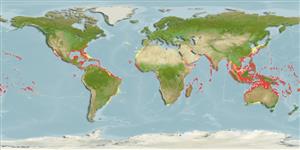Common names from other countries
Classification / Names / Names
Nomes comuns | Sinônimos | Catalog of Fishes (gen., sp.) | ITIS | CoL | WoRMS
Environment: milieu / climate zone / depth range / distribution range
Ecologia
; estuarina; intervalo de profundidade 0 - 70 m (Ref. 83908). Tropical
Atlantic Ocean: from the west coast of Florida, USA to the Caribbean, including Gulf of Mexico, south to Brazil, east to Canary Islands and south to São Tomé & Príncipe; Indian Ocean: from Yemen to Kwazulu Natal, South Africa, including Madagascar, Seychelles, Aldabra, east to India and south to Dampier Archipelago, Western Australia including the Andaman, Chagos Archipelago and Diego Garcia Atoll; Pacific Ocean: from Japan to the South China Sea and south to Queensland, Australia including Federated States of Micronesia, east to American Samoa.
Length at first maturity / Tamanho / Peso / Idade
Maturity: Lm ? range ? - ? cm
Thallus consists of a horizontal branched stolon and feather-like erect branches. Upcurved cylindrical pinnules are pinnately or distichously arranged along the side of the distal portion of
branch axes and sometimes tristichously arranged at the lower or basal portion of the erect branches. Erect branches up to 10 cm in height (Ref. 80758).
Used for human consumption as food and medicine: antifungal, lowers blood pressure (Ref. 80758). Maximum depth from Ref. 102144.
Guiry, M.D. and G.M. Guiry. 2009. (Ref. 80701)
Status na Lista Vermelha da IUCN (Ref. 130435: Version 2024-1)
Status no CITES (Ref. 108899)
Not Evaluated
Not Evaluated
Perigo para os humanos
Uso pelos humanos
Pescarias: espécies comerciais
| FishSource |
Ferramentas
Mais informação
Idade/TamanhoCrescimentoComprimento-pesoComprimento-comprimentoMorfologiaLarvasAbundância
Fontes da internet
Estimates based on models
Preferred temperature
(Ref.
115969): 23.4 - 29, mean 27.4 (based on 2022 cells).
